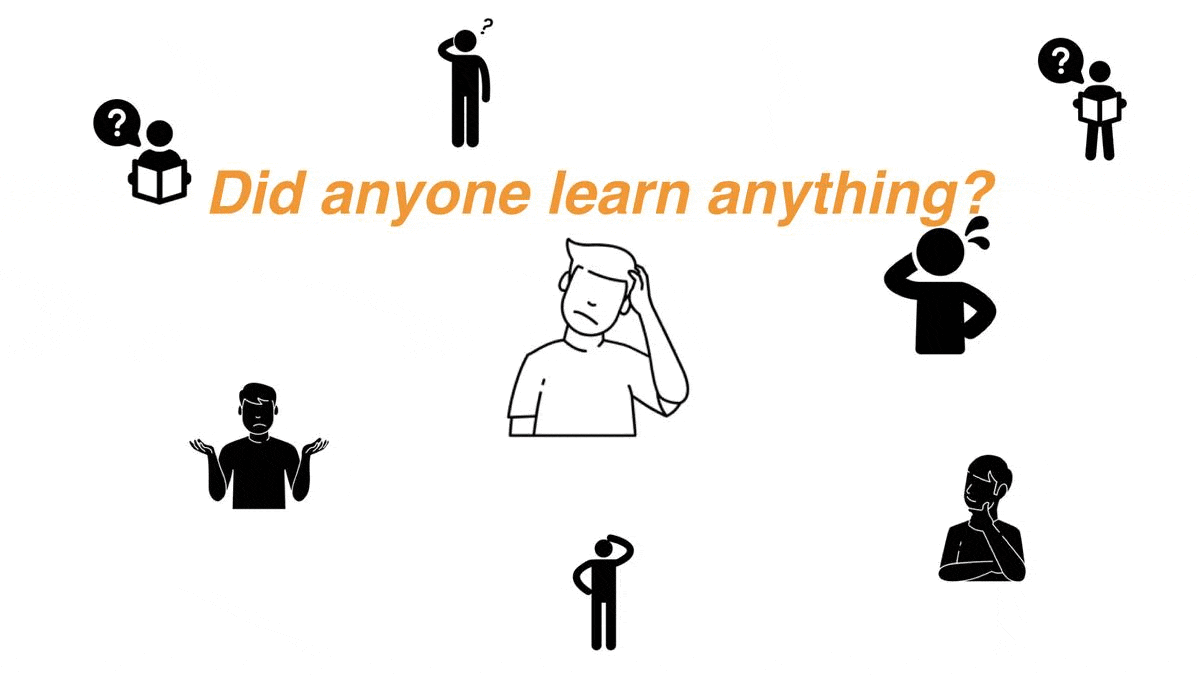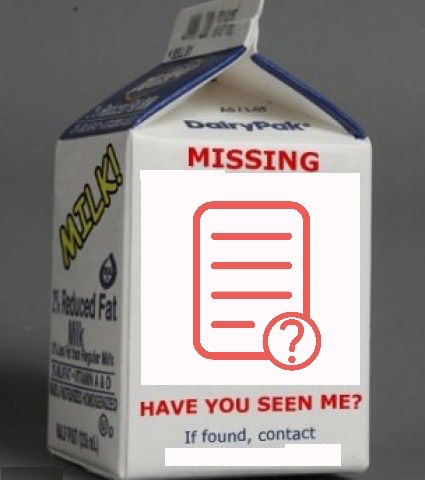Did anyone learn anything?
 The meeting is over. Did anyone learn anything? And how would you know?
The meeting is over. Did anyone learn anything? And how would you know?
An EventTech Chat discussion
I greatly enjoy participating in EventTech Chat, “a weekly conversation about meeting and event technology, including software, hardware, and audiovisual for in-person and online events” hosted by pals Brandt Krueger and Glenn Thayer.
During last week’s chat, one of the topics we discussed was whether there are differences in how people learn online, as opposed to face-to-face. This led to conversations about learning styles (be careful, they’re mostly mythical and barely useful), the importance of taking responsibility for your own learning at meetings, and how meeting formats affect what people learn.
Are you a regular reader of this blog? If so, you might have guessed—correctly—that I had plenty to say about these important issues. There is plenty of solid research on the best ways to support effective learning. We know that:
- presenters need to incorporate audience engagement;
- social learning is humans’ true superpower;
- serving up learning in small bites works much better than long lectures; and
- active and uncovered learning in a community takes learning to a whole new level.
Of course, even if we know the best ways to maximize useful learning and connection at meetings, that doesn’t mean we implement them. Unfortunately, our meetings are still full of lectures.
This brings us to an important question we hardly ever ask about meetings…
Did anyone learn anything?
In my book Conferences That Work, I shared a story about when I—and everyone else in my graduate class—never admitted we didn’t understand what our teacher was teaching us for weeks.
…toward the end of my second year I was understanding less and less of a mathematics course I was taking. The professor seemed to be going through the motions—he asked few questions, and there was no homework. Elementary particle physicists are either mathematicians or experimentalists. I was the latter, so my lack of mathematical understanding was not affecting my research work. But the experience was disconcerting.
And, as the semester went on, the percentage of class material I understood gradually declined.
One day, our teacher announced that we would be studying Green’s Functions, a technique used to solve certain kinds of equations. After the first 20 minutes of the class I realized that I understood nothing of what was being said, and that I was at a crucial turning point. If I kept quiet, it would be too late to claim ignorance later, and it was likely I would not understand anything taught for the remainder of the semester. If I spoke up, however, I was likely to display my weak comprehension of everything the teacher had covered so far.
Looking around, I noticed that the other students seemed to be having a similar experience. Everyone looked worried. No one said a word.
The class ended and the professor left. I plucked up my courage and asked my classmates if they were having trouble. We quickly discovered, to our general relief, that none of us understood the class. What should we do? Somehow, without much discussion, we decided to say nothing to the teacher.
The class only ran a few more weeks, and the remaining time became a pro forma ritual. Did our teacher know he had lost us? I think he probably did. I think he remained quiet for his own reasons, perhaps uncaring about his success at educating us, perhaps ashamed that he had lost us.
When I didn’t speak up, I chose to enter a world where I hid my lack of understanding from others, a world where I was faking it…
…Probably you’ve had a similar experience; a sinking feeling as you realize that you don’t understand something that you’re apparently expected to understand, in a context, perhaps a traditional conference, where nonresponsiveness is the norm. It’s a brave soul indeed who will speak out, who is prepared to admit to a conference presenter that they don’t get what’s going on. Have you stayed silent? Do you?
Silence isn’t golden
Silence during a presentation and a lack of questions at the end does not mean that anyone learned anything. As Jonah Berger reminds us in Contagious, “Behavior is public and thoughts are private.”
If my teacher had bothered to periodically ask his class whether they understood what he was attempting to teach, or, better, asked questions to check, we’d likely have told or shown him we were lost.
So, how can we discover if anyone learned anything?
Three better ways to obtain long-term evaluations of events are Net Promoter Scores, A Letter to Myself, and The Reminder. Check out this post for more details.
Ultimately, we can’t ensure or guarantee that anyone learned anything at a meeting. As Glenn pointed out during our EventTech Chat, the ultimate responsibility for learning is the learner’s. Attend a meeting expecting that the leaders will magically transfer learning to you without doing any work yourself? You probably won’t learn much, if anything.
Nevertheless, we can actively help people learn at meetings by implementing the principles listed above. (Check out my books for complete details.) But there’s one additional thing we can do to maximize and extend learning during our meetings.
How to help people consolidate what they learn at meetings
During our EventTech Chat, several participants shared how they consolidate learning during or immediately after an event. Folks who have learned the value of this practice and figured out the ways that work best for them may not need what I’m about to share (though even they can often benefit).
What I’ve found over decades of designing meetings is that the majority of meeting attendees do not know how to consolidate what they learn there. So I designed a closing plenary that gives each participant a carefully structured opportunity to review, consolidate, and reinforce what they have learned at the conference. They also get to develop the next steps for changes they will work on in their professional lives. It’s called a Personal Introspective and takes 60 – 90 minutes to run. (You can find full details in Chapter 57 of The Power of Participation.)
Did anyone learn anything? There are no guarantees. But, following the above advice will make it significantly more likely that your attendees will learn what they want and need to learn. Do you have other thoughts on how to improve how you or others learn at meetings? If so, please share them in the comments below.

 One of the easiest, yet often neglected, ways for meeting professionals to improve their craft is to obtain (and act on!) client feedback after designing/producing/facilitating an event. So, I like to schedule a thirty-minute call at a mutually convenient date one or two weeks after the event, giving the client time to decompress and process attendee conference evaluations.
One of the easiest, yet often neglected, ways for meeting professionals to improve their craft is to obtain (and act on!) client feedback after designing/producing/facilitating an event. So, I like to schedule a thirty-minute call at a mutually convenient date one or two weeks after the event, giving the client time to decompress and process attendee conference evaluations. There are some things that the meeting industry doesn’t like to talk about in public. For example:
There are some things that the meeting industry doesn’t like to talk about in public. For example: